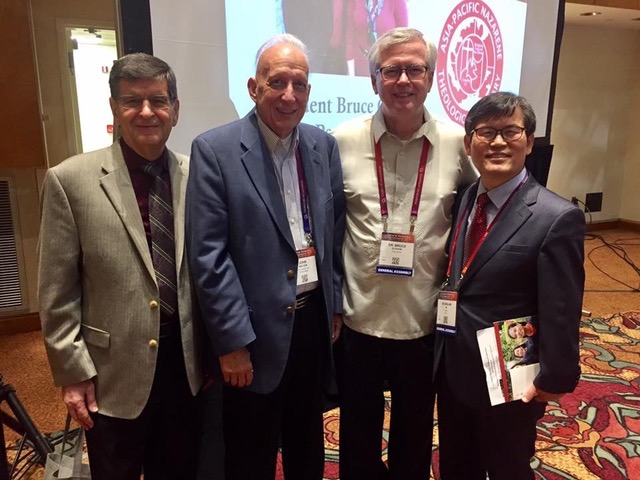For years I have taken seriously the discipline of a structured yearly review by my supervisor and/or a committee of the Board of Trustees to whom I reported. Recently I was ”reviewed” in a formal annual “job performance” evaluation by the Global Ministry Center jurisdictional General Superintendent and my supervisor, Dr. J.K. Warrick. It was a profitable experience.
Administrators who worked with me over the years at Mount Vernon Nazarene University know how seriously I took the annual (three hour) review and evaluation of our work together. I would use different evaluation instruments each year, but the fact of the review was never in question. It is a critical component of serving in our assignments as faithful stewards of the leadership assignments to which God has called us.
Recently I was asked by a college board in one of our world regions to work with the school principal (in other parts of the world the school principal is called the president, director, or vice chancellor). The Board not only wants an evaluation instrument to use in the Board’s review of the principal, but an instrument that the principal can also use with the school’s senior administers and faculty.
When the word “leader” is used in the draft instrument, (linked below) the word is referring to the person being reviewed—principal, senior administrator or faculty.
Goals
The goals of the official review/evaluation process are as follows:
1. Affirm and strengthen the identity, mission and vision of the institution.
2. Encourage and support the leader in affirming his/her leadership strengths and addressing leadership initiatives;
3. Provide appropriate input by the Board of Governors into the review/evaluation process (the input of the Board in the review of the principal will be different from the input of the Board in the review of senior administrators and faculty).
4. Identify and clarify existing or potential conflicts between the leader and institutional governing board that may undermine unity needed to sustain the spiritual and numerical growth of the institution.
5. Embrace and strengthen the institutional strategic goals, immediate (1 year); short term (2-3 years) and long term (4 years) as presented by the leader being reviewed.
The review/evaluation has three sections. Sections one and three are to be completed by the leader prior to the official review. Section two is to be completed prior to the official review by the supervisor or Board committee. A “Competency Grid” is included to assist a supervisor and/or an official review team in evaluating the leadership competencies and leadership behaviors of the person being reviewed.
The review of leadership competencies and behavior of the person being evaluated is built around core assumptions that outstanding leaders are usually known for their decisiveness and fierce resolve. For great Christian leaders, you will also find that they:
Speak Gracefully. They watch the words they speak.
Live Gratefully. They don’t whine or cry but are grateful.
Listen Intently. They seek first to understand.
Forgive Freely. They are proactive in extending forgiveness.
Lead Humbly. They harness the power of community life and
make decisions with much grace and deep humility.
Care Deeply: They value people, not power.
Pray Earnestly. They believe that God can work in them to
become the change they desire to see in others.
For more reflection on these core convictions and assumptions, please read: “When Good and Godly People Collide over Vision” by clicking here for English or Spanish.
You will notice that the entire process is called “Ministry Effectiveness Review and Evaluation” and not “Job Performance Analysis.” Reviews based strictly on measurable goals and results may work in some professions, but not in the vocation of ministry. Goal setting is an essential part of the “Ministry Effectiveness” review process. Equally important for a review in a Christian college, a local church or a Christian not-for-profit organization are questions like:
1. Has your sense of calling and personal ministry been fulfilled through your leadership endeavors? If not, why? If so, how? Do you feel affirmed as a valuable asset? If not, why? If so, how?
2. In what ways have you developed and enhanced your job knowledge and ministry effectiveness? Have adequate opportunities been provided both for training and for personal growth since your last review/evaluation? Please give examples.
3. In what ways have your initiatives contributed to the numerical growth and spiritual development of the institution you serve?
4. In what ways can the Board of the school support you to lead more effectively?
5. What are your three top institutional challenges for the next year? The next four years?
6. What short-term and long-term goals have you established for your assignment and for your institution in the coming year? The next four years? What measure will you use for accountability?
The Ministry Effectiveness Review/Evaluation includes a component whereby the leader identifies key leadership areas in need of developing during the next four years, and concludes with section designed to summarize both the leadership strengths and leadership limitations of the person being reviewed.
Rooted in this process is a deep sense of stewardship of the leadership gifts given to us, and a profound respect for the leadership vocation to which we are called. To participate in a structured review of our ministry effectiveness is both a discipline and a responsibility. It is not just “Jesus and me,” but includes “my brothers and my sisters….” We live, work, and define our identity in and through a community of faith. Iron sharpens iron.
“Let the peace of Christ keep you in tune with each other, in step with each other. None of this going off and doing your own thing. And cultivate thankfulness. Let the Word of Christ—the Message—have the run of the house. Give plenty of room in your lives. Instruct and direct one another using good common sense. And sing, sing your hearts out to God! Let every detail in your lives—words, actions, whatever—be done in the name of the Master, Jesus, Thanking God the Father every step of the way.” Colossians 3. The Message. Amen!
Click here to see the draft evaluation instrument and compentency grid.
I welcome your comments and suggestions that strengthen the instrument.
LeBron Fairbanks
January 3, 2011





